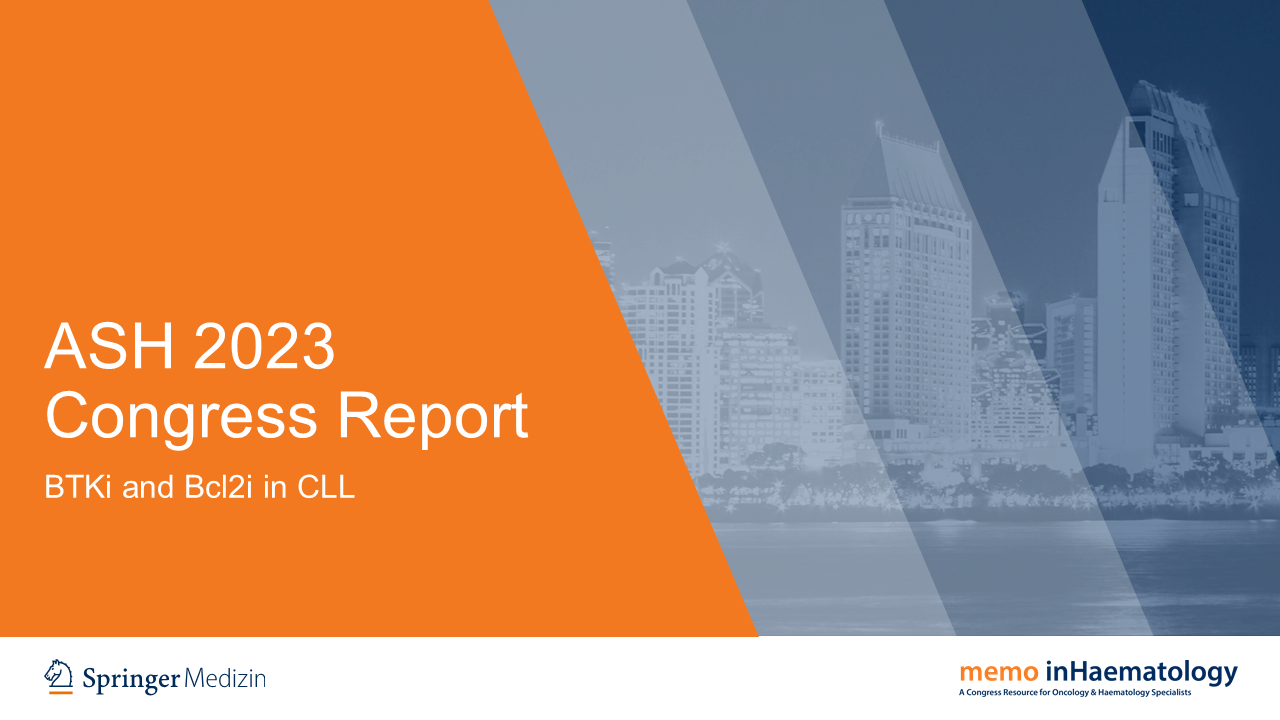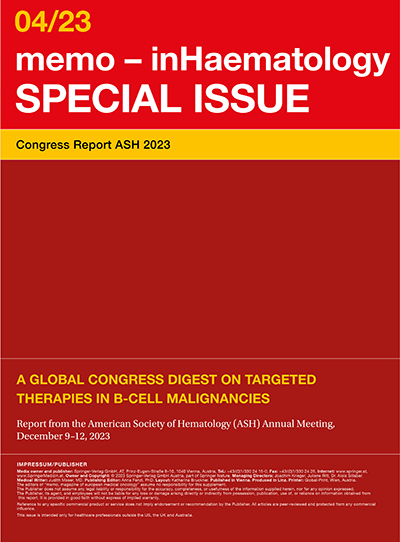ASH 2023 – hybrid
Lecture Board: Othman Al-Sawaf, MD; Jorge J. Castillo, MD; Chan Cheah, MD; Francesca M. Gay, MD, PhD; Anath C. Lionel, MD, PhD; Paolo Strati, MD; Jason Westin, MD
Medical Writer: Judith Moser, MD
Publishing Editor: Anna Fenzl, PhD
Preface – ASH 2023
The 65th Annual Meeting of the American Society of Hematology (ASH) took place as a hybrid event that hosted participants both online and on-site in in San Diego, California, USA. Among the multitude of updates and new insights presented from December 9th to 12th, 2023, attendees had access to thousands of scientific abstracts highlighting cutting-edge research in hematology.
Mantle cell lymphoma: emerging treatment regimens and new standards
Based on promising results of early-phase studies, the multinational, double-blind, placebo-controlled phase III SYMPATICO trial is evaluating the concurrent administration of the BTK inhibitor ibrutinib and the Bcl-2 inhibitor venetoclax in the setting of relapsed/refractory mantle cell lymphoma (MCL). Patients after 1–5 prior therapies who had received ≥ 1 rituximab/anti-CD20-containing regimen were randomized to either ibrutinib plus venetoclax (n = 134) or ibrutinib plus placebo (n = 133).
Waldenström macroglobulinemia: optimizing outcomes in the first and later lines
Th e randomized phase III ASPEN study compared the next-generation BTK inhibitor zanubrutinib with ibrutinib in patients with symptomatic, MYD88-mutated Waldenström macroglobulinemia (WM), demonstrating a trend towards better response quality and decreased toxicity in the zanubrutinib arm. Eligible patients who participated in trials of zanubrutinib for the treatment of B-cell malignancies could enroll in the BGB-3111-LTE1 study.
Improving responses in multiple myeloma
An established treatment approach for transplant-eligible patients with newly diagnosed multiple myeloma (MM) is induction treatment with bortezomib, lenalidomide and dexamethasone (VRd) followed by autologous stem cell transplantation (ASCT), VRd consolidation, and lenalidomide maintenance. The multinational phase III PERSEUS study compared this schedule to an expanded regimen containing the anti-CD38 antibody daratumumab in addition to induction and consolidation with VRd (D-VRd) as well as lenalidomide maintenance (D-R).
Follicular lymphoma: BTK inhibition and bispecific antibodies
With respect to the treatment of newly diagnosed follicular lymphoma (FL), there is room for improvement as many patients relapse after first-line chemoimmunotherapy. The frontline use of lenalidomide and rituximab (R2) has proven highly active in patients with FL. A single-arm phase II study investigated the addition of the BTK inhibitor acalabrutinib to R2 in patients with untreated FL based on the hypothesis that this combination will increase efficacy due to beneficial effects on the immune microenvironment.
Updated findings in CLL with a focus on BTK- and Bcl-2–targeted therapies
Personalization of treatment duration of ibrutinib plus venetoclax using measurable residual disease (MRD) was explored in fit patients with previously untreated chronic lymphocytic leukemia (CLL) in the multicenter, randomized, open-label, phase III FLAIR trial. At ASH 2023, Hillmen et al. presented the results for the comparison of ibrutinib plus venetoclax (n = 260) with 6 cycles of fludarabine, cyclophosphamide, and rituximab (FCR; n = 263).
Exploring chemotherapy-free approaches in the treatment of DLBCL
For decades, the CHOP regimen has been the first-line standard of care for patients with newly diagnosed diffuse large B-cell lymphoma (DLBCL). Significant improvement was achieved through the addition of rituximab (R-CHOP). Ever since, however, multiple clinical trials investigating expanded or alternative treatment regimens have not succeeded in further improving patient outcomes.
Innovative agents in marginal zone lymphoma and other B-cell malignancies
Relapses are common in patients with marginal zone lymphoma (MZL), and sequential therapy is often necessary. At ASH 2023, Tedeschi et al. reported findings for 22 patients with relapsed/refractory MZL who received the oral second-generation Bcl-2 inhibitor sonrotoclax at different dose levels (i.e., 40 mg, 160 mg, 320 mg, 640 mg OD) in the first-in-human, phase I, multicenter BGB-11417-101 study.
ASH 2023 EXPERT INTERVIEWS
Barbara F. Eichhorst describes possible approaches to improve the early detection of molecular CLL relapses, discusses venetoclax-based first-line combinations in CLL, and rates the relative efficacy and safety of different BTK inhibitors in relapsed/refractory CLL while finally sharing her personal highlights from the ASH 2023 congress.
Ramón García-Sanz gives insights into the assessment of residual disease in multiple myeloma and explains future clinical implications of these data. Moreover, he discusses in which ways the evaluation of minimal residual disease might improve the management of patients with Waldenström macroglobulinemia and shares his personal highlight from the ASH 2023 congress.
Stephan Stilgenbauer discusses the current evidence regarding the treatment of Richter transformation with modern agents and reviews the findings of the RT1 trial presented at the ASH 2023 meeting. Finally, he highlights future combinations of novel agents like adding the next-generation BCL-2 inhibitor sonrotoclax to tislelizumab plus zanubrutinib which will be investigated in the amendment of the RT1 trial or the use of the non-covalent BTK inhibitor pirtobrutinib combined with epcoritamab, a bispecific antibody, that will be in the focus of the international RT2 trial.





